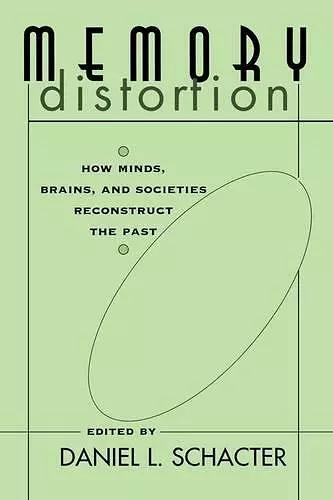Memory Distortion
How Minds, Brains, and Societies Reconstruct the Past
Joseph T Coyle editor Daniel L Schacter editor Lawrence E Sullivan editor Gerald D Fischbach editor Marek-Marsel Mesulam editor
Format:Paperback
Publisher:Harvard University Press
Published:30th Oct '97
Currently unavailable, and unfortunately no date known when it will be back

Hypnosis, confabulation, source amnesia, flashbulb memories, repression--these and numerous additional topics are explored in this timely collection of essays by eminent scholars in a range of disciplines. This is the first book on memory distortion to unite contributions from cognitive psychology, psychopathology, psychiatry, neurobiology, sociology, history, and religious studies. It brings the most relevant group of perspectives to bear on some key contemporary issues, including the value of eyewitness testimony and the accuracy of recovered memories of sexual abuse.
The distinguished contributors to this volume explore the full range of biological phenomena and social ideas relevant to understanding memory distortion, including the reliability of children's recollections, the effects of hypnosis on memory, and confabulation in brain-injured patients. They also look into the activity and role of brain systems, cellular bases of memory distortion, and the effects of emotion and trauma on the accuracy of memory. In a section devoted to the social aspects of memory distortion, additional essays analyze the media's part in distorting social memory, factors influencing historical reconstruction of the collective past, and memory distortion in religion and other cultural constructs. Daniel Schacter launches the collection with a history of psychological memory distortions. Subsequent highlights include new empirical findings on memory retrieval by a pioneer in the field, some of the foremost research on computational models, studies of the relationship between emotion and memory, new findings on amnesia by a premier neuroscientist, and reflections on the power of collective amnesia in U.S. history, the Nazi Holocaust, and ancient Egypt.
This is a particularly timely book that compiles the presentations from a 1994 conference sponsored by the Harvard Center for the Study of Mind, Brain, and Behavior. The uniqueness of this volume comes from the diversity of its contributors. It brings together neurobiological, cognitive, psychiatric, neuropsychological, and sociocultural perspectives on the issue of memory distortion. The fundamental theme running through this book is that remembering is a process of reconstruction...The volume competently demonstrates that mind-brain sciences have progressed to a level where scientists of differing ilk may each proffer a different level of analysis...and yet have a meaningful dialogue. -- Shitij Kapur, M.D. * American Journal of Psychiatry *
We owe much to Daniel Schacter for tackling head-on the question of the fallibility of memories. Schacter and colleagues have chosen a challenging interdisciplinary format to present essays on the increasingly controversial topic of memory distortion. This collection of essays emerged from a conference and subsequent discussion groups described as an 'interface between disciplines'. This description embodies the tone of Memory Distortion, which takes on the format of a congenial but lively debate among colleagues. -- Mark W. Jacobson and Dean C. Delis * Contemporary Psychology *
Human memory [is not] like a photograph album, a collection of cassettes, compact discs or videos or any other accumulative archive of the past. Rather, memories are fragmentary, condensed, often distorted and inaccurate representations of past experience. This point is made in impressive detail by all the contributors to this excellent collection of essays on memory distortion...Memory Distortion provides an outstanding multidisciplinary perspective on memory accuracy, ranging from cognitive psychology through psychiatry, neuropsychology and neurobiology, to sociocultural analyses. -- Martin A. Conway * Nature *
This is a superb collection of chapters, which covers an impressive and wide range of topics related to memory distortion...[E]xploring this phenomenon at many levels is absolutely crucial...[and] I recommend the book to everyone with an interest in normal and pathological distortion. -- Lars Nyberg * European Journal of Cognitive Psychology *
ISBN: 9780674566767
Dimensions: unknown
Weight: 549g